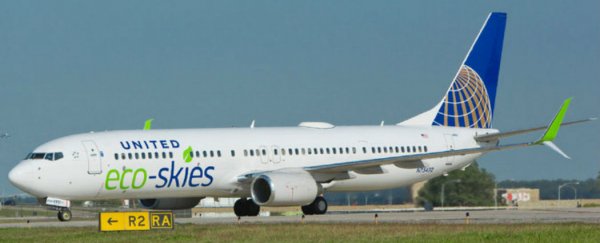United Airlines has announced it will start fuelling its planes with poop-based biofuel this year, and in doing so will become the first commercial airline in the world to actively move away from regular jet fuel.
In the next few months, the plane will fly a regular load of passengers from Los Angeles International Airport to San Francisco using 30 percent biofuel produced from farm animal waste and fats. In the weeks following, it will repeat the journey four or five times to test the efficiency.
These poop-fuelled flights aren't just a simple publicity stunt - they're an attempt by United Airlines to head off the stricter limits on carbon emissions that the Obama administration proposed for the aviation industry this month. According to Had Mouawad and Diane Cardwell at The New York Times, the United Nation's International Civil Aviation Organisation is also working on its own negotiations to limit carbon pollution by early next year.
In response, a handful of commercial airlines have announced investments in biofuel manufacturers, with United Airlines announcing this week that it's handing over $30 million to one of the world's largest producers, Fulcrum BioEnergy.
"We know alternative fuels is an emerging industry that is vital to the future of aviation and this is just one of our initiatives to help make these fuels saleable and scalable," United's executive vice president, Brett Hart, said in a statement to the press. "Investing in alternative fuels is not only good for the environment, it's a smart move for our company, as biofuels have the potential to hedge against future oil price volatility and carbon regulations."
While this will contribute to a mere fraction of the airline's annual fuel requirements - Mouawad and Cardwell report that in 2014, its fleet used up 3.9 billion gallons of jet fuel, worth $11.6 billion - it's the most substantial investment by a major commercial airline ever. The plan is to gradually introduce biofuels into its entire fleet, and presumably work at increasing that 30 percent portion. US-based Alaska Airlines and Southwest Airlines and the Hong Kong-based Cathay Pacific have pledged smaller amounts to secure their own biofuel supply.
"Fulcrum said its technology can cut an airline's carbon emissions by 80 percent compared with traditional jet fuel," The New York Times reports, adding that representatives at Fulcrum have quoted prices at "a lot less than" $1 a gallon, which makes it half as expensive as regular jet fuel.
We're excited to see how this goes. Just as Georgetown in Texas is switching to 100 percent renewable energy because it can't afford not to, and Hawaii is doing the same in an effort to stop buying and importing expensive fuels, it doesn't matter if the reason behind United's move towards sustainability is more about being forced to than altruism. What matters is it's actually happening, and that's good enough for us.
